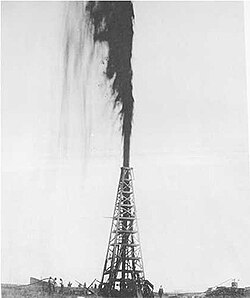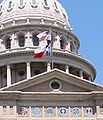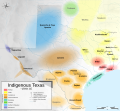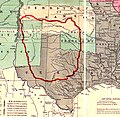
Back Portal:Texas Spanish Portail:Texas French Portale:Texas Italian Portal:Texas Portuguese Портал:Техас Russian
The Texas Portal
Texas (/ˈtɛksəs/ ⓘ TEK-səss, locally also /ˈtɛksɪz/ TEK-siz; Spanish: Texas or Tejas, pronounced [ˈtexas]) is the most populous state in the South Central region of the United States. It borders Louisiana to the east, Arkansas to the northeast, Oklahoma to the north, New Mexico to the west, and an international border with the Mexican states of Chihuahua, Coahuila, Nuevo León, and Tamaulipas to the south and southwest. Texas has a coastline on the Gulf of Mexico to the southeast. Covering 268,596 square miles (695,660 km2), and with over 31 million residents as of 2024, it is the second-largest state by both area and population. Texas is nicknamed the Lone Star State for its former status as an independent republic. Spain was the first European country to claim and control Texas. Following a short-lived colony controlled by France, Mexico controlled the land until 1836 when Texas won its independence, becoming the Republic of Texas. In 1845, Texas joined the United States of America as the 28th state. The state's annexation set off a chain of events that led to the Mexican–American War in 1846. Following victory by the United States, Texas remained a slave state until the American Civil War, when it declared its secession from the Union in early 1861 before officially joining the Confederate States of America on March 2. After the Civil War and the restoration of its representation in the federal government, Texas entered a long period of economic stagnation. Historically, five major industries shaped the Texas economy prior to World War II: cattle, bison, cotton, timber, and oil. Before and after the Civil War, the cattle industry—which Texas came to dominate—was a major economic driver and created the traditional image of the Texas cowboy. In the later 19th century, cotton and lumber grew to be major industries as the cattle industry became less lucrative. Ultimately, the discovery of major petroleum deposits (Spindletop in particular) initiated an economic boom that became the driving force behind the economy for much of the 20th century. Texas developed a diversified economy and high tech industry during the mid-20th century. As of 2022[update], it has the most Fortune 500 company headquarters (53) in the United States. With a growing base of industry, the state leads in many industries, including tourism, agriculture, petrochemicals, energy, computers and electronics, aerospace, and biomedical sciences. Texas has led the U.S. in state export revenue since 2002 and has the second-highest gross state product. (Full article...) Selected article -The Free State of Galveston (sometimes referred to as the Republic of Galveston Island) was a satirical name given to the coastal city of Galveston in the U.S. state of Texas during the early-to-mid-20th century. Today, the term is sometimes used to describe the culture and history of that era. During the Roaring Twenties, Galveston Island emerged as a popular resort town, attracting celebrities from around the country. Gambling, illegal liquor, and other vice-oriented businesses were a major part of tourism. The "Free State" moniker embodied a belief held by many locals that Galveston was beyond what they perceived were repressive mores and laws of Texas and the United States. Two major figures of the era were the businessmen, power brokers and crime bosses Sam and Rosario Maceo, who ran the chief casinos and clubs on the island and were heavily involved in local politics and the tourism industry. The success of vice on the island, despite being illegal, was enabled by lax attitudes in society and in government, both on the island and in the county. In one of the more famous examples of this, a state committee, investigating gambling at the fabled Balinese Room, was told by the local sheriff that he had not raided the establishment because it was a "private club" and because he was not a "member". (Full article...) Selected biography - Ima Hogg (July 10, 1882 – August 19, 1975), known as "The First Lady of Texas", was an American society leader, philanthropist, mental health advocate, patron and collector of the arts, and one of the most respected women in Texas during the 20th century. Hogg was an avid art collector, and owned works by Picasso, Klee, and Matisse, among others. Hogg donated hundreds of pieces of artwork to Houston's Museum of Fine Arts and served on a committee to plan the Kennedy Center in Washington, D.C. An enthusiastic collector of early American antiques, she also served on a committee tasked with locating historical furniture for the White House. She restored and refurbished several properties, including the Varner plantation and Bayou Bend, which she later donated to Texas arts and historical institutions who maintain the facilities and their collections today. Hogg received numerous awards and honors, including the Louise E. du Pont Crowninshield Award from the National Trust for Historic Preservation, the Santa Rita Award from the University of Texas System, and an honorary doctorate in fine arts from Southwestern University. Hogg was the daughter of Sarah Ann "Sallie" Stinson and James Stephen "Big Jim" Hogg, later attorney general and governor of the state. Ima Hogg's first name was taken from The Fate of Marvin, an epic poem written by her uncle Thomas Hogg. She endeavored to downplay her unusual name by signing her first name illegibly and having her stationery printed with "I. Hogg" or "Miss Hogg". Although it was rumored that Hogg had a sister or sisters, whose names were suggested to be "Hoosa Hogg", "Ura Hogg" or "Wera Hogg", she had only brothers. Hogg's father left public office in 1895, and soon after, her mother was diagnosed with tuberculosis. When Sarah died later that year, Jim Hogg's widowed elder sister moved to Austin to care for the Hogg children. Between 1899 and 1901, Hogg attended the University of Texas at Austin; she then moved to New York City to study piano and music theory for two years. After her father's death in 1906, she traveled to Europe and spent two years studying music under Xaver Scharwenka in Vienna. When she returned to Texas, she established and managed the Houston Symphony Orchestra and served as president of the Symphony Society. (Full article...) Texas news
Wikinews Texas portal
ListsState symbols
Texas topicsSelected imageCities -Wichita Falls (/ˈwɪtʃɪtɑː/ WITCH-ih-tah) is a city in and the county seat of Wichita County, Texas, United States. It is the principal city of the Wichita Falls metropolitan statistical area, which encompasses all of Archer, Clay, and Wichita Counties. According to the 2020 census, it had a population of 102,316, making it the 43rd-most populous city in Texas. The city was named, in 1876, for a waterfall on the Wichita River, which was destroyed due to flooding in 1886. (Full article...) General imagesThe following are images from various Texas-related articles on Wikipedia.
CategoriesSelect [►] to view subcategories
Related pages
Attractions
 Things you can doAssociated WikimediaThe following Wikimedia Foundation sister projects provide more on this subject:
SourcesMore portals | ||||||||||||||||||||||||||||||||||||||||




































































